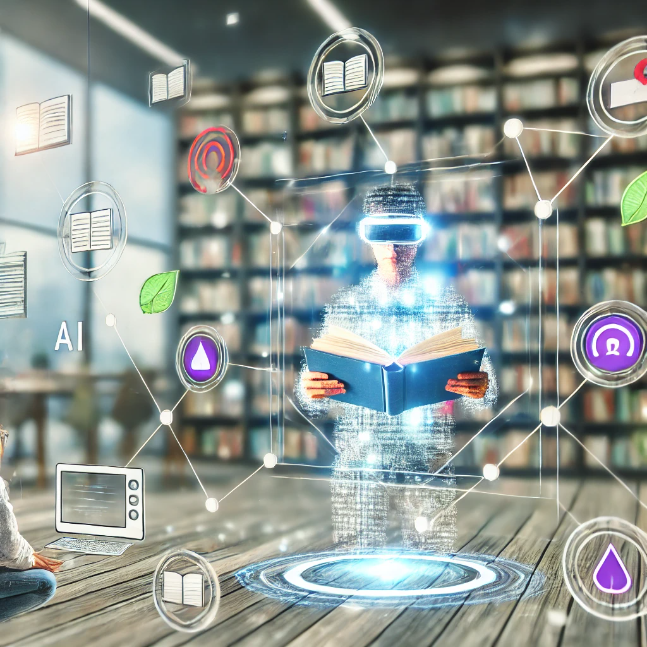The Future of Books: Integrating Cutting-Edge Technology into Reading

The world of books has undergone significant transformations over the centuries, from ancient scrolls to the printing press, and now to digital eBooks. As technology continues to evolve, so does the way we read and interact with literature. Imagine a future where books are not just static texts but immersive, interactive experiences that engage all your senses. Welcome to the era of smart books.
Smart Books: The Next Leap in Reading
Smart books, equipped with advanced technology, are set to revolutionize the way we read, learn, and experience stories. These books incorporate augmented reality (AR), virtual reality (VR), artificial intelligence (AI), and haptic feedback to create an unparalleled reading experience. Let’s delve into the features that make smart books a game-changer in the literary world.
Augmented Reality: Bringing Stories to Life
Augmented reality overlays digital content onto the real world, enhancing the reader's experience. Imagine reading a fantasy novel where the characters and scenes come to life right before your eyes. With AR-enabled books, readers can use their smartphones or AR glasses to see animated illustrations, 3D models, and interactive elements that blend seamlessly with the physical pages.
For example, in a historical novel, AR can project ancient monuments, battle scenes, or intricate artifacts, providing a visual and educational layer to the narrative. This technology not only makes reading more engaging but also helps readers better understand and visualize complex concepts.
For more on how AR is transforming storytelling, check out our detailed article on The Evolution of Storytelling: Virtual and Augmented Reality VR AR in Books.
Virtual Reality: Stepping into the Story
Virtual reality takes immersion to the next level by allowing readers to step inside the story. With VR headsets, readers can explore fictional worlds, interact with characters, and experience events as if they were actually there. This technology is particularly exciting for genres like science fiction, fantasy, and adventure, where the setting plays a crucial role.
Imagine reading a mystery novel where you can walk through a virtual mansion, examine clues, and solve puzzles alongside the protagonist. VR books can transform passive reading into an active, participatory experience, making the story more memorable and engaging.
Artificial Intelligence: Personalized Reading Experience
Artificial intelligence can analyze a reader's preferences, reading speed, and comprehension level to tailor the book to their needs. AI can suggest related content, provide real-time translations, and even adjust the complexity of the text based on the reader's proficiency.
Moreover, AI-powered books can include interactive dialogues where readers can ask characters questions or make choices that influence the story's outcome. This creates a personalized narrative experience, where no two readings are exactly the same.
For a deeper dive into how AI is crafting tailored reading experiences, explore our comprehensive article on Artificial Intelligence: Personalized Reading Experience.
Haptic Feedback: Feeling the Story
Haptic feedback technology adds a tactile dimension to reading. Special gloves or devices can simulate textures, vibrations, and movements, allowing readers to feel the weight of a sword, the texture of a dragon's scales, or the rumble of an earthquake. This multisensory approach enhances immersion and makes the reading experience more vivid and realistic.
Educational Benefits
Smart books have immense potential in education. Interactive textbooks can provide real-time quizzes, 3D visualizations of scientific concepts, and step-by-step tutorials for complex subjects. This makes learning more interactive, engaging, and effective.
For language learners, AI-powered smart books can offer instant translations, pronunciation guides, and interactive exercises to improve vocabulary and grammar skills. This personalized approach can significantly enhance the learning experience and outcomes.
Challenges and Considerations
While the future of smart books is exciting, there are challenges to consider. The cost of technology, accessibility, and the potential for screen fatigue are important factors. Ensuring that smart books are affordable and accessible to a wide audience will be crucial for their success.
Additionally, the balance between technology and traditional reading should be maintained. While smart books offer new ways to engage with literature, the timeless joy of reading a physical book should not be overshadowed.
Conclusion
The integration of advanced technology into books is set to transform the way we read and experience stories. Smart books, with their augmented reality, virtual reality, artificial intelligence, and haptic feedback features, offer an immersive, interactive, and personalized reading experience. As these technologies continue to develop, the possibilities for innovation in literature are limitless. The future of reading is here, and it’s more exciting than ever.
For a comprehensive look into how AI is shaping the future of personalized reading, visit our detailed article on Artificial Intelligence: Personalized Reading Experience.



